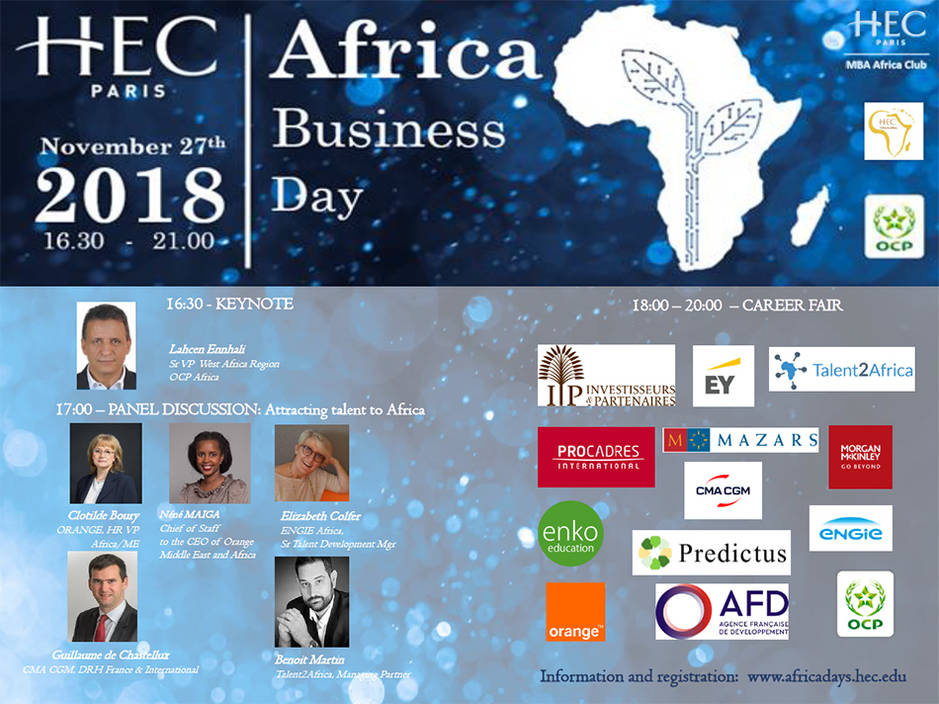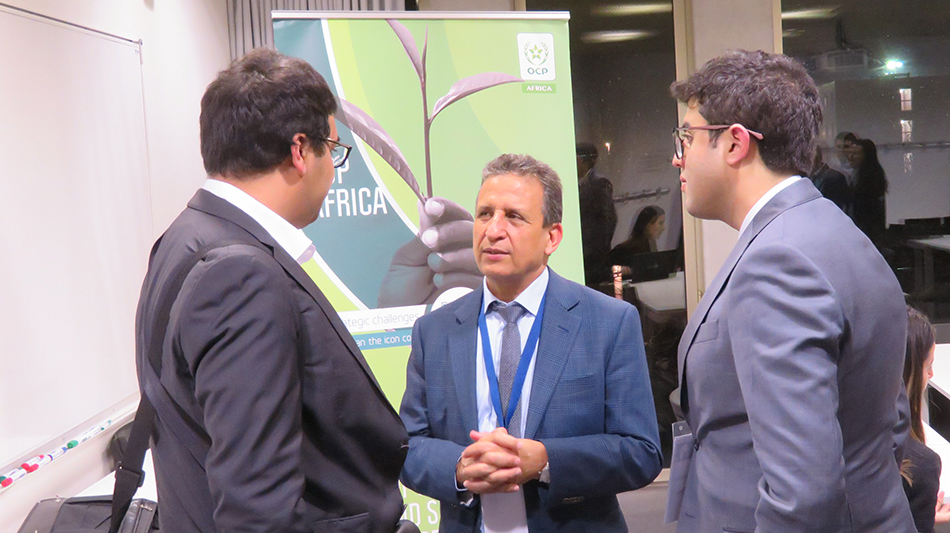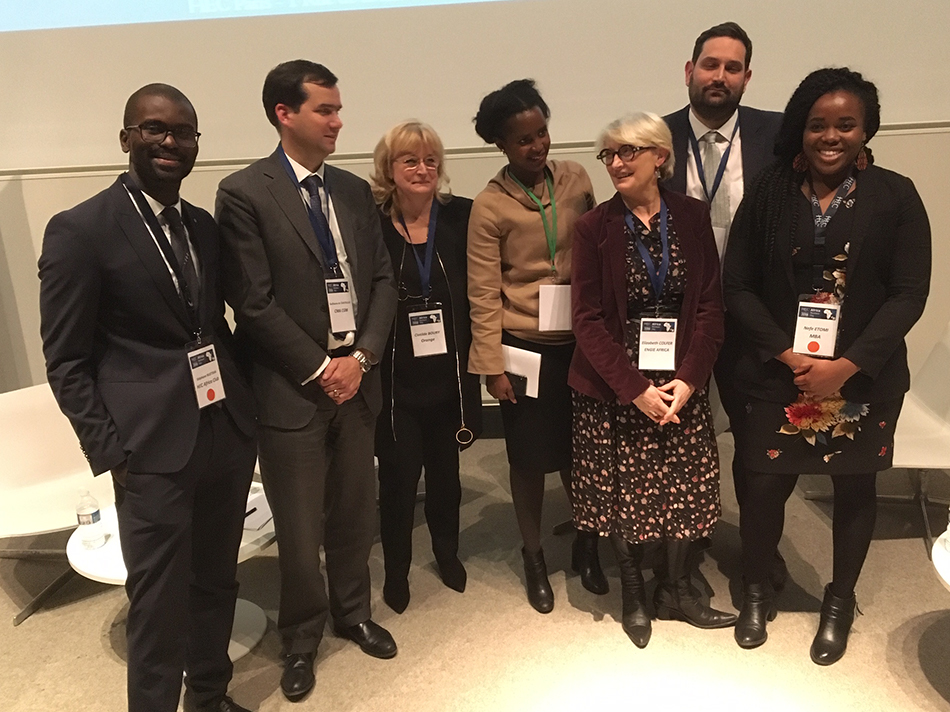Agility and Innovation for African Business
HEC Paris hosted its first-ever Africa Business Day at the close of last year, further underlining its commitment to casting a spotlight on the continent’s economic development. The event closed the second season of AfricaDays, run by HEC’s International Affairs department.

Co-organized with the school’s Career Center, the MBA Africa Club and HEC Africantilles, the five-hour event featured a keynote speech by a senior representative from the sponsor OCP and a high-caliber roundtable debate. It was capped by networking sessions between representatives from 12 companies and students exploring job opportunities in Africa.
The atmosphere was indisputably upbeat for an evening designed to encourage the 120 people attending this inaugural HEC event to invest in the African continent’s business future. MBA Africa Club president Stephane Nuetsha set the tone from the outset. “Today’s event is not about poverty, famine or corruption in Africa. Today is about making the world realize that there’s more to the continent than meets the eye. Africa is a place where, above all else, you can conjugate successful business and good living.”
Statistics did not give lie to Nuetsha’s vision. African Business Day (ABD) arrived at a moment, for example, when figures show the continent’s tech and startup ecosystem enjoy a 300+% leap in total funding compared to 2017. “We believe 2018 will go down as a monumental year in the history of the African startup ecosystem,” trumpeted Weetracker. The website also noted the 200% rise in deals concluded in the same period. “That is happening,” noted Quartz Africa’s Yinka Adegoke in a 2019 New Year editorial, “while the ecosystems’ fortunes are being increasingly decoupled from the state in their local economies.” Meanwhile, World Bank figures show that six of the world’s ten fastest growing economies in 2018 are in the African continent.
Agricultural Productivity
None of the speakers at the conference were downplaying the challenges Africa still faces, however. According to The Africa Report, 18 million new jobs must be created by 2035 and around $75 billion spent on infrastructure to answer the demands for greater business efficiency. “There are vital inter-sectoral challenges we must address,” insisted keynote speaker Moulay Lahcen Ennahli. He is the Senior Vice President West Africa for OCP (Office chérifien des phosphates), a world leader in phosphate exports, and the sponsor of both this inaugural ABD and AfricaDays 2018. Ennahli enumerated the priorities to be redressed as food security, education, access to finance, affordability and availability of resources.

The former engineer said agriculture depends on answering all these challenges. “There is a proverb we use at OCP: ‘Feeding the soil to feed the planet’. Africa has 60% of the world’s available arable land. We need to increase its productivity.” Ennahli took the example of millet: “This is the most widely grown crop in Africa, yet the yield is four times higher in China! To answer low productivity, we at OCP take a holistic, crop-value chain approach in the 16 countries where we are present. And we put the smallholder farmers at the center of our intervention strategy. For this, we need the collaboration of all stakeholders: public, private and development networks. Economists have noted a growth in all sectors: energy, transport, infrastructure, finance, digital – that’s why we believe in Africa.” And he turned to the students: “You here are actors of the future, talents who can change and make the difference in creating an alternative narrative.”

Finding and Keeping the Best
This clarion call was echoed by the five panelists who were invited to debate about how their companies seek to attract, recruit and, crucially, retain talent in Africa. Chaired with aplomb by Nigerian-American MBA student Nene Etomi, the panel featured representatives from Orange, Talent2Africa, Engie and CMA CGM. “When someone who knows and loves the continent goes abroad and acquires a world-class education, we need that person to come back and help us build a better Africa,” said Nene Maïga, Chief of Staff to the CEO of Orange Middle East and Africa, leaning proudly on her years of on-the-ground experience in Mali and Senegal. The vivacious HEC Grande Ecole graduate (2012) was compelling in arguing for a return to Africa: “I worked in La Défense for a long time and, believe you me, it was a lot more boring than working in West Africa. It’s innovating faster than any other space in the world. Everyone has a cellphone. But,” she tempered, “the challenge is overcoming illiteracy by making sophisticated technology as simple and low-cost as possible. We need innovation, strong skill sets and partnerships. Orange is working with startups, universities and schools all over Africa as a long-term investment in cellphones capable of harnessing IOT and data as simply as possible.”
For Elizabeth Colfer, it is in fintech and adaptability where Africa is showing greatest promise. The Senior Talent Development Manager at Engie BU Africa has also been driving partnerships with young entrepreneurs and business schools to “go to the source and get talents young”. “Our method is centered on mutual acculturation,” she said. “We are handing over the keys to people on the ground by bringing ex-pats on missions of 3-5 years to encourage a transfer of technology. This has helped the continent leapfrog obstacles. Engie is looking for people here who are agile, risk-takers, pragmatic. Africa is a great learning ground to get a job done.”
Exploring Job Opportunities
Dynamic as the debate was, it was the career fair and networking cocktail which dominated the evening. Students from HEC’s MBA, Grande Ecole and Master programs filed through the S building classrooms where a dozen African-based companies had set up shop. The range of activities was striking. Mabel Udoh, Global Head of Talent Attraction & Development at Puma Energy described her company’s investments in 49 of the continent’s 54 countries, shrouded by a giant-sized poster saying “Fueling Life’s Amazing Journey (Busting a groove in Accra)”. She fielded challenging questions from SASI (Master in Sustainability and Social Innovation) students on environmental issues and promised an excellent work/life balance for all newcomers.
HEC graduate Sarah Pariser (H16), meanwhile, vaunted the merits of Enko Education, a network of international schools in seven African states which has expanded rapidly ever since Eric Pignot (H03) co-founded the enterprise in 2012. “We are looking to recruit interns, specialists in marketing and MBA graduates who can help grow our company,” disclosed Pariser. Enko Education aims to open a further 30 schools in 20 African countries by 2024, building on results which have seen its learners graduate into some of the world’s top universities.
Lively Debates
Further along the corridor, Abdoulaye Dicko participated in a lively exchange with Hugues Vincent-Genod, who has been working for I&P on the launch of new impact funds in Africa since 2013. Dicko is in the Executive Master “Strategic Information Systems Management”. He already has a strong background in entrepreneurship in his native Mali, having exploited his rich educational background in IT and digital transformation to found ITS Mali in 2009. “I spent ten years developing a business based on a unique system of electronic monitoring for cross-national trucking companies to bring merchandize into Mali,” he explained. “But the challenges of corruption, political instability and overbearing state intervention made it extremely difficult to continue.” He went on: “How does I&P answer such challenges?” Vincent-Genod, who has co-authored the 74-page handbook “Investing in Africa’s Small and Growing Business”, sympathized. “It’s not always easy, which is why at I&P we often work under the radar. We collaborate very closely with businesses, reinforcing them through free consultations over a period of up to a year. We are also very cautious in certain sectors like construction and agriculture. As for corruption, we are intransigent, companies we accompany must show total transparency in their business transactions.”
For first year Grande Ecole student Alicia Farlin-Bagosora, the ABD event was an eye-opener. “I’ve been exploring opportunities to return to my parents’ homeland for a while now,” she said during the after-event cocktail. “Tonight gave me plenty of avenues to explore. The companies present seem truly committed to strategies for high-quality recruitment from schools like ours. I saw plenty of students respond positively to their presentations, not just for business ventures. There was one who hopes to go to the Congo Kinshasa to exploit her previous training in medicine, for example.” Would she imagine doing the same with the skills in finance and consultancy she is picking up at HEC? “Sure, why not? They’re asking for young graduates with agilities, and ideas, I think I have both.”
The careers fair already appears to have brought its fruits for Stephane Nuetsha. The Cameroonian has just completed his MBA in Finance and Strategy. Weeks after the ABD, he was recruited to run the West Africa branch of the maritime company CMA CGM, based in Ouagadougou, Burkina Faso. A remarkable step-up for the ambitious engineer who is geed up to, in the words of the company’s motto, “ship the future”.